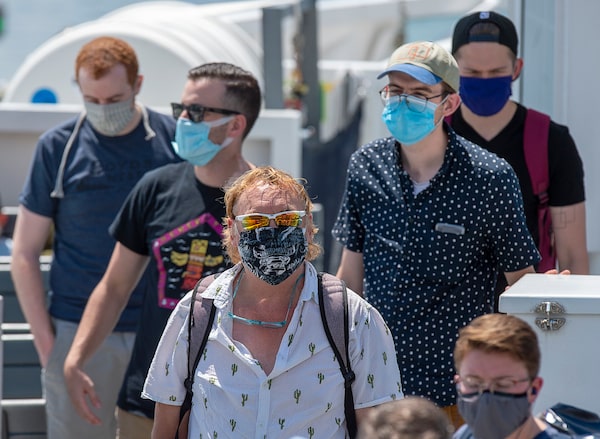
Passengers wear face masks on a Halifax Transit ferry as it arrives in Dartmouth, N.S. on Friday, July 24, 2020, the first day they have been mandatory on public transit.Andrew Vaughan/The Canadian Press
Nova Scotia has zero confirmed active COVID-19 cases – including no new cases and no hospitalizations – for the first time since the beginning of the pandemic.
The microbiology lab at the QEII Health Sciences Centre in Halifax completed 433 tests on Saturday and found no new cases, the province said in a statement issued Sunday.
The milestone in the Atlantic province comes as other parts of Canada – including B.C., Alberta and Ontario – are seeing a resurgence in cases linked to reopenings and private gatherings, with young people accounting for many of the new cases.
Lisa Barrett, an infectious disease doctor at Nova Scotia Health and a professor and researcher at Dalhousie University, said she is excited by the fact the province currently has no active cases. She credited the early buy-in from Nova Scotians for driving the case count down: Many people stayed home and avoided busy places before they were told to do so.
What are my chances of catching COVID-19 if I take a flight?
Raise a glass to COVID-19? Maybe not
However, she cautioned that no confirmed cases does not mean no cases, and said the province should facilitate more widespread testing.
“Our testing numbers are between 250 and 500 a day lately, sometimes a little more,” Dr. Barrett said. “That’s not a ton of [tests] for a province with a million people and a lot of people crossing the border and coming in to airports every day.
“I think there are still active cases out there. We just haven’t tested them yet.”
Nova Scotia has recorded a total of 1,067 cases and 63 deaths, with those who have fallen ill ranging in age from 10 to 90. It has not identified a new case of the disease since July 14.
The province has announced a number of measures in recent weeks to curb the spread of the new coronavirus, including a requirement that anyone visiting from the Atlantic provinces show proof of residency to enter. Those who reside outside the “Atlantic bubble” are required to fill out a tracking and self-declaration form and self-isolate for 14 days.
As of last Friday, it became mandatory for drivers and passengers on public transportation to wear non-medical masks. And beginning this Friday, people will also be required to wear masks in most indoor public places, including retail businesses, movie theatres and beauty salons.
There are some exceptions: Masks are required in common areas of office buildings but not in private offices, and in public areas of college and university campuses but not in classrooms, labs and offices, for example.
Premier Stephen McNeil said continued vigilance is necessary to minimize the impact of a second wave of COVID-19 as the province continues to reopen its economy, schools and communities.
“Wearing a non-medical mask in most indoor public places is a key part of how we protect each other and support our local businesses so they can stay open for the long run,” he said in a statement on Friday.
Dr. Barrett encouraged Nova Scotians to enjoy the summer but to keep basic precautions in mind. This includes keeping gatherings small and other personal contacts limited, wearing a mask and practising good hand hygiene.
“The difference between zero and 50 cases takes no time. This is not a hypothetical, this is not the bogeyman; it’s happening all across our country right now,” she said, citing Kelowna, B.C., as an example.
At least 78 people contracted the disease after events and parties in the B.C. city around Canada Day, and nearly 1,000 others are in self-isolation across the province stemming from related potential exposures.
“That’s what I’d say to people: Would you rather be a little cautious on the precautions or would you prefer that we walk everything backwards because we have a bad week, we get a ton of new cases and then we spend the summer on lockdown?”
As of Sunday, there were about 5,600 confirmed active cases of COVID-19 across the country. In all, at least 113,898 people in Canada have tested positive for the disease, with 99,355 recoveries and 8,889 deaths. Health officials have administered more than four million tests.
British Columbia averaged more than 30 new cases each day last week, after rarely having seen more than 20 new cases a day since May, while Alberta recorded more than 100 new cases every day last week – a level also not seen since May. Neither province provided an update on the weekend.
On Sunday, Ontario recorded 137 new cases, with 58 per cent of those cases in people under 40. Quebec confirmed 169 new cases and one more death.
Our Morning Update and Evening Update newsletters are written by Globe editors, giving you a concise summary of the day’s most important headlines. Sign up today.
 Andrea Woo
Andrea Woo